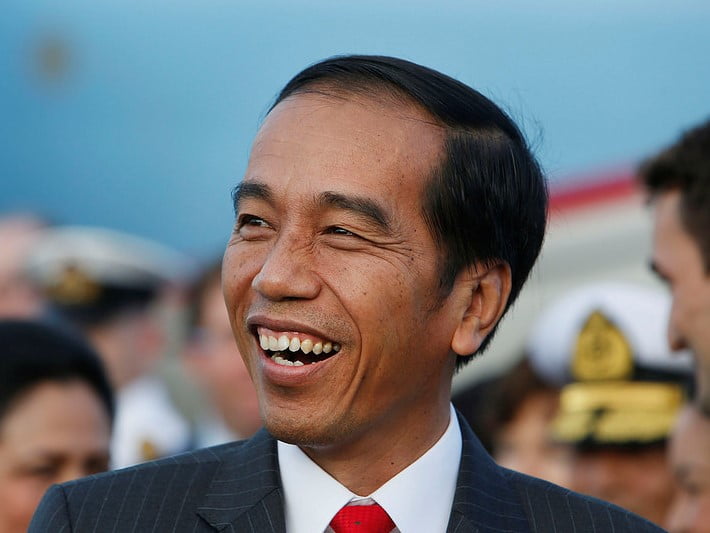Indonesian president Joko Widodo is only half-joking when he says the current weirdness in global politics was the result of the arrival of global entertainment phenomenon Netflix.
He says politicians have to work harder at their own reality TV efforts, otherwise everyone would watch House of Cards and Stranger Things instead.
Notwithstanding the fact that this might well be true, President Widodo used the jokiness to highlight the impact of platform technologies on global economies and said the region faced a one-in-a-generation opportunity to get on board.

President Widodo is cut from the same businessman-turned-politician cloth as Prime Minister Malcolm Turnbull.
They are said to get on well; both are techno-centric thinkers who have put the embrace of innovation at the centre of broader economic policy.
“We politicians have to now compete against Netflix to grab your attention. Since the arrival of Netflix we politicians have no choice but to turn politics into reality TV,” President Widodo told the opening session of an ASEAN-Australia CEO summit on Saturday.
“But Netflix is at the leading edge of the digital revolution. Like it or not, everyone and everything is being transformed by the mobile internet, by cloud computing, and by the digital economy,” he said.
As the centre of gravity for the world economy moved from the Atlantic to the Pacific, the ASEAN countries sat at the geographic centre of the fastest growing region in the world.
It is no wonder Mr Turnbull has put so much emphasis within this conference on improving the intra-regional infrastructure of the digital economy – and between ASEAN and Australia – and has been working to promote standards to reduce trade friction in digital transactions.
The Prime Minister also dropped $30 million on a new ASEAN-Australia smart cities initiative, which will help build the digital smarts that enables better use of data and more efficient use of infrastructure.
The centre of gravity of global economic activity is not lost of Mr Turnbull. Growth in the region continues to be exceptional, even if Australia’s SME engagement with ASEAN has been slow to recognise it.
“The IMF forecasts that over the next five years, six of ASEAN’s economies will grow faster than China, and every single one of ASEAN’s economies will grow faster than both the United States and Europe,” he said.
Noting that the “the most significant historical development in the world today is the rise of hundreds of millions of people around the world into the global middle-class,” President Widodo then told the CEO’s the difference in this particular economic and technology cycle was social media.
He nominated the “selfie” as the century’s most important innovation so far. It’s not a bad observation, and one that has far reaching implications for business opportunities across the region.
Joko maintains that social media and the ubiquitous ‘selfie’ has changed global consumerism, and is at the heart of the growth of “experientialism” (taking a selfie in exotic locations and dining rooms).
The phenomenon has driven a global tourism boom. World economic growth is hovering at around 3 per cent, while world tourism is growing at about 7 per cent – and one in every four new jobs in the world to be created in the tourist industry.
To be clear, President Widodo is pointing to 25 per cent of all new jobs in the world in the next ten years being created in the tourism sector. That’s a huge opportunity for Australians turning the “mining boom into a dining boom” in AgriTech and FinTech.
It also underscores the infrastructure boom across the region, with airports being upgraded, seaports, highways and high-speed trains.
The rise of the middle class in the region creates specific opportunities for Australian banks and FinTechs. According to Joko, if the big banks don’t take the opportunity, there are global ecommerce players that most certainly will.
“The rise of hundreds of millions of young new middle class [people] in ASEAN is leading to the dramatic expansion of financial savings. These savings must be channelled into – among other things – infrastructure projects, industry and ecommerce,” President Widodo said.
ASEAN must build capital markets at scale – “a big and deep and liquid capital market, similar to the Euro zone and to US capital markets, he said.”
“This is a big opportunity for Australian banks and Australian financial institutions. Or if the banks will not seize this opportunity, then some aggressive eCommerce companies will do so.”
Malcolm Turnbull has outlined Australia’s interest in the region. Beyond the 100,000 students from ASEAN who are enrolled in Australian universities at any one time.
There are so many areas where ASEAN and Australia are natural partners. Agri-Food, supply-chain logistics , tourism and aviation, digital transformation services – a very big agenda for Indonesia – advanced manufacturing and industry 4.0, future energy supply chains,” Mr Turnbull said.
“All are ripe with potential for closer collaboration.”
Do you know more? Contact James Riley via Email.

